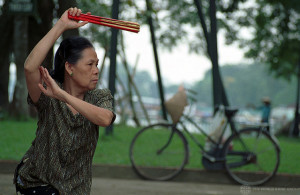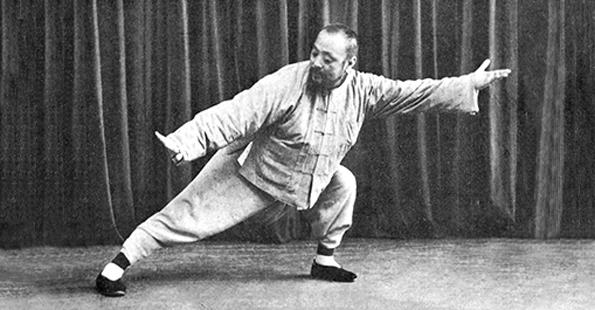The martial (wu)
The roots of the Classics lie not only in Chinese philosophy. A large number of Taijiquan masters were instructors in the Chinese military. This also coined their language. Thus, e.g. in the Mental Elucidation of the 13 Basic Movements it is stated:
The heart/mind (xin) is the commander,
the qi is the flag
and the waist is the banner.
(Taijiquan-Lilun Journal 4, p. 4)
Being part of the Chinese military Taijiquan masters certainly came in contact with the writings of strategists. The most famous one among them is Sunzi with his book the Art of War (Sunzi Bingfa), but there are still numerous other authors. The influence of the strategic literature expresses itself in the form of analogue thoughts. Thus, e.g. at Tai Gong:
In planning nothing is more important
than not being knowable.
(Sawyer, p. 69)
And in the Taijiquan Classic:
The other does not know me,
I alone know the other.
(Taijiquan-Lilun Journal 2, p. 8)
The technical terms for the description of strategic matters come directly from the literature of strategists. Thus one speaks e.g. both among the strategists and in Taijiquan of the strategic advantage (shi). Sunzi:

That the velocity of cascading water
can send boulders bobbing about
is due to its strategic advantage (shi).
That a bird of prey
when it strikes
can smash its victim to pieces
is due to its timing.
So it is with the expert at battle
that his strategic advantage (shi) is channelled
and his timing is precise.
(Ames, p. 120)
The Taijiquan Treatise states:
In advancing and retreating,
one can gain the opportunity
and the strategic advantage (shi).
(Taijiquan-Lilun Journal 3, p. 4)
Even the concept of full (shi) and empty (xu) are found in both texts. Sunzi:
On the way to victory
avoid the full and attack the emptiness.
(Ames, p. 124)
The Taijiquan Treatise:
Empty and Full have to be clearly distinguished.
Each point has its empty and full aspect.
Everywhere there is always empty and full.
(Taijiquan-Lilun Journal 3, p. 4)
In addition to contact with the military, other martial arts had influence on Taijiquan. Thus, e.g. the founding myth of Taijiquan is also found in other internal martial arts. In a text on the internal martial arts master Wang Chennan, who had no contact to Taijiquan, it is stated:
“Shaolin is famous for its boxers. However, its techniques are chiefly offensive, which creates opportunities for an opponent to exploit. Now there is school that is called ‘internal’ which overcomes movement with stillness. Attackers are effortless repulsed. Thus we distinguish Shaolin as ‘external’. The Internal School was founded by Zhang Sanfeng of the Song dynasty. Zhang Sanfeng was a Daoist alchemist of the Wudang Mountains. He was summoned by Emperor Hui Zong of the Song, but the road was impassable. That night he dreamt that the God of War transmitted the art of boxing to him and the following morning single-handedly killed over a hundred bandits.” (Wile, p. 53)
In the Taijiquan Classic it is stated: “This is taken from the work of the teacher Zhang Sanfeng of the Wudang Mountain, who wants the heroes of this world to use it to prolong their lives and not only for martial arts.” (Taijiquan-Lilun Issue 2, p. 9)
Overall, one has to say that the masters of Taijiquan in developing their art used ideas from various origins and they have certainly tried to collect the best material for this purpose. Through the study of the Classics everyone can see a successful outcome.
Ames Roger, Sun-tzu: The Art of War, Ballantine Books, New York 1993
Boedicker, Freya and Martin, The Philsophy of Tai Chi Chuan, Blue Snake Books, Berkley, California, 2009
Lin Yutang, The Importance of Living, Quill, New York
Ma Yueliang, Xu Wen, Wushi Taijiquan Tuishou, Xianggang Shanghai Shuju Chuban, Hongkong 1986
Sawyer D. Ralph, The Seven military classics of ancient China, Westview Press, Colorado 1993
Taijiquan-Lilun Journal 1 (in English), Forum for trad. Wu Tai Chi Chuan, Düsseldorf 2003
Taijiquan-Lilun Journal 2 (in English), Forum for trad. Wu Tai Chi Chuan, Düsseldorf 2003
Taijiquan-Lilun Journal 3 (in German), Forum for trad. Wu Tai Chi Chuan, Düsseldorf 2003
Taijiquan-Lilun Journal 4 (in German), Forum for trad. Wu Tai Chi Chuan, Düsseldorf 2003
Taijiquan-Lilun Journal 5 (in German), Forum for trad. Wu Tai Chi Chuan, Düsseldorf 2004
Wile Douglas, T´ai Chi´s Ancesters, Sweet Ch´i Press, New York 1999

Leave a Reply